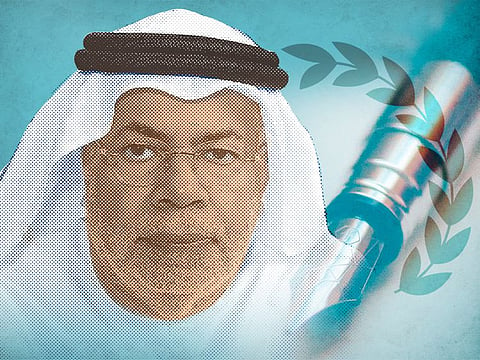Habib Al Sayegh’s search for literary excellence
I was witness to some pursuits that made the UAE poet a literary icon in the Arab world

As a literary genius, Habib Al Sayegh has a special place in the UAE’s heart. As friends and fellow journalists, we both shared a special bond. Having known and worked with Al Sayegh, I was witness to some of the pursuits that made him a journalistic and literary icon in the Arabian Peninsula and the Gulf.
I first met Al Sayegh in 1978 when he was deputy editor at Al Ittihad [Arabic language newspaper], where I used to write a weekly opinion column. Over the years, our friendship grew as we used to meet regularly at cultural seminars. We also had several mutual friends.
In those days, what set Al Sayegh apart was his keenness to nurture new talents in journalism, literature and poetry.
In fact, he launched the first page for aspiring writers in the UAE — called Pen Club — in Al Ittihad. The late poet, writer and researcher Ahmad Rashid Thani was one of the UAE stalwarts who enjoyed Al Sayegh’s support as a youngster.
Writing remained his passion. An uninterrupted daily column — the longest-running in the UAE — since February 1978 was another feature of Al Sayegh’s stint at Al Ittihad. In 1980, he launched the UAE’s first cultural supplement through Al Fajr newspaper.
As spearhead of the new Emirati poetry movement, his creativity earned recognition from far and wide. His poems were translated into several languages.Mohammad Hassan Al Harbi
In the early eighties, Al Sayegh’s first poetry collection was published by Dar Al Kalima in Beirut. It was part of the first Emirati publications to find a pride of place on the shelves of local and Arab libraries.
Around the same time, we worked together on the Arab Times weekly. Published every Wednesday, it was produced from an office in Abu Dhabi but issued from Sharjah.
“Every reader is an editor” was the motto of the weekly that represented opinion journalism. It catapulted Gulf and Arab media into the modern era.
Arab Times became a favourite with university students and ordinary people, who found the commentaries reflecting their concerns and aspirations. The writings were characterised by deep meanings on a diverse range of subjects.
Israeli aggression snuffed out our hopes
The publication was shut down at a critical stage in the UAE’s history, when the union was being formed. The weekly’s demise led many youngsters, who are passionate about expression, to seek pastures abroad. Al Sayegh, our friend Mohammad Abu Al Qasim Haj Mohammad, a Sudanese writer and intellectual, and I travelled to Beirut excited at the prospect of establishing a magazine like the Arab Times.
In Beirut, we discussed with Hussain Hallaq, founder and owner of Dar Al Kalima publishing house, a plan to start a Gulf cultural magazine, called Awraq, in Lebanon. But the launch had to be put on hold due to the Israeli invasion of Lebanon in 1982.
We watched in disbelief as Israeli warplanes bombarded southern Lebanon, Sidon and Beirut. One of the bombs hit the basement we had rented as a production facility for our magazine.
It was very painful and shocking. What saddened us more was the lack of demonstrations in the Arab world to protest the occupation of an Arab capital. The sole consolation was the voice of Lebanese composer and singer Marcel Khalifa, who sang the late Palestinian poet Mahmoud Darwish’s poem on Beirut.
Also Read: Iraq comes back from the cold
Also Read: Emirati culture key to women empowerment
Also Read: A Daesh comeback hangs over Iraq
The Israeli aggression snuffed out our hopes of publishing a magazine from Beirut. We returned to the UAE, and Al Sayegh explored the possibility of launching it from London, Cyprus or any other European capital so that the magazine could be distributed in the UAE as a foreign publication.
Al Sayegh and I soon went separate ways, but maintained our friendship.
He then founded and edited Awraq magazine from 1982 to 1995, and was actively engaged in the local and Arab cultural scene. In 1998, he obtained a Master’s in comparative linguistics from the University of London, and was nominated for the Nobel Prize for Literature. Later Al Sayegh helmed the Al Khaleej [Arabic language newspaper] and remained its editor-in-chief until his death. During this period in Abu Dhabi, Al Sayegh played a prominent role in powering the UAE’s cultural movement. He led the UAE Writers Union and was secretary-general of the Arab Writers Union.
In Al Sayegh's death at the age of 64, the UAE lost one of its literary giants, a pioneer who gave a new direction to poetry, literature and journalism in the country. As spearhead of the new Emirati poetry movement, his creativity earned recognition from far and wide. His poems were translated into several languages.
A part of Habib Al Sayegh will always remain in me. His poems and writings will continue to be beacons for future generations. That’s his legacy. Rest in peace, Habib.
— Mohammad Hassan Al Harbi is a renowned columnist and author whose writings cover various fields ranging from media studies to education.
Sign up for the Daily Briefing
Get the latest news and updates straight to your inbox



